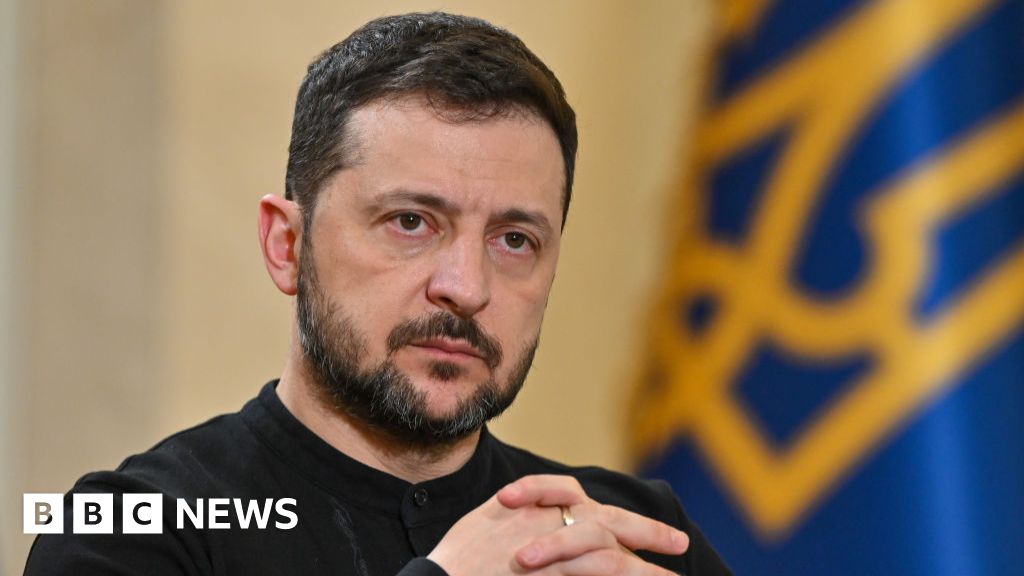The difficult choices facing Volodymyr Zelensky
- BBC News
Ukraines Volodymyr Zelensky is in a bind.
After last Fridays disastrous meeting in the Oval Office, it seems nothing that he says goes down well with President Donald Trump. And now the US has suspended aid to Ukraine, his options are looking increasingly thin.
Even a former close Republican ally in the US, Senator Lindsey Graham, has turned on him, suggesting "he either needs to resign and send somebody over that we can do business with, or he needs to change".
What kind of change might that be - or should he resign if thats the price of US support?
This option seems Zelenskys most likely way out and Ukraines prime minister now says Kyiv is open to talks on signing a minerals deal with the US.
Trump told Zelensky point-blank on Friday he was not in a very good position: "You dont have the cards right now - with us you start having cards."
Zelensky had been ready to sign-off on the minerals deal with Trump on Friday before he was told to leave the White House.
That particular card appears to have remained on the table, and on Monday night Zelenskys chief aide Andriy Yermak said he was working on it with Republican Congressman Brian Fitzpatrick and the deal was "crucial for both our countries".
But clearly the Trump administration is holding out for more.
Zelensky cannot afford to be humbled into an abject apology. After three years of Russian bombardment, Ukrainians are not in the mood for capitulation.
But he would have to find a form of words sufficient to appease Trump.
He might also have to accept a ceasefire on Trumps terms, even if he still believes peace is "very, very far away".
Would the deal mean a resumption of aid and to what extent? Certainly thats a priority for Kyiv.
The head of parliaments foreign affairs committee, Oleksandr Merezhko, says suspending US aid is dangerous for Ukraines ability to defend its own civilians.
Falling on his sword is not something Zelensky will or can consider.
Trump has called him both unelected and a dictator, echoing Vladimir Putins Russian propaganda narrative since the start of the war.
Zelensky said on Sunday night it seemed "a bit undemocratic" for Ukrainians to be told who should be their president.
He is after all Ukraines elected leader, and although his term was meant to end last year, he remains president under martial law, which came into place precisely because of Putins Russian invasion.
It would be a great result for Putin, who has sought to replace Zelensky since the start of the war and will not even talk directly to him "because of his illegitimacy".
But the only way Zelensky would consider it would be in exchange for Nato membership for Ukraine, and Trump has said he should forget about that.
Several Ukrainian figures made clear on Tuesday they would hold out for as long as necessary without US aid, but some reports suggest the US pause has halted critically important air defence missiles and artillery.
Ukrainian MP Fedir Venislavskyi told local media that they could last about six months, but only the US could provide them with air defence systems and long-range multiple rocket systems.
Prime Minister Denys Shmyhal says Ukraine is already producing about a third of the weapons it needs, and its goal was 50%.
So could Zelensky rely on European allies instead?
European nations have collectively paid out substantially more than the US in aid to Ukraine, and the head of the European Unions executive Commission, Ursula von der Leyen, has announced plans to beef up Europes defence capability.
She is proposing up to €800bn in defence funding - some of which would also go to helping Ukraine.
But the EU and UK are adamant that US security guarantees are vital in the event of a ceasefire, even if in Sir Keir Starmers words "it is right that Europe do the heavy lifting".
Denis Shmyhal himself describes concrete US guarantees as "existentially important" for Ukraine and the entire continent.